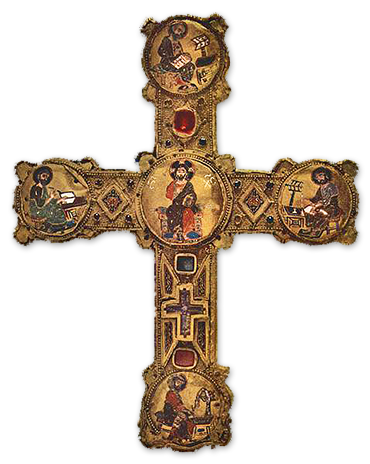
![]()
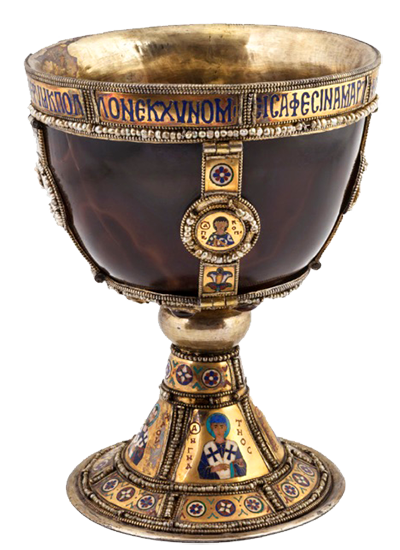

Odo of Deuil was the future abbot of Saint Denis 1151-1169
The French forces arrived at Constantinople on October 4, 1147. There they were both impressed by the splendor of the city and alarmed by the suspicious actions of the Greeks. They stayed at the Philopation Palace, which was located outside the city walls for three weeks. Louis VII traveled with his wife Eleanor of Aquitaine. The Philopation Palace was set in a game park - you could see it from the galleries of the Church of the Holy Apostles outside the Charistos Gate. Odo of Deuil, who stayed there with the king described it as a splendid "springtime resort - a beautiful and spacious enclosed area with canals and ponds".
Constantinople is the glory of the Greeks. Rich in fame, richer yet in wealth, the city is triangular in shape, like a ship's sail. In its inner angle lies Santa Sophia and the Palace of Constantine, in which there is a chapel honored for its sacred relics (the church of the Pharos). The city is hemmed in on two sides by the sea: approaching the city, we had on the right the Arm of St. George and on the left a certain estuaryl6 which branches off from it and flows on for almost four miles. There is set what is called the Palace of Blachernae which, although it is rather low, yet, rises to eminence because of its elegance and its skillful construction. On its three sides the palace offers to its inhabitants the triple pleasure of gazing alternately on the sea, the countryside, and the town. The exterior of the palace is of almost incomparable loveliness and its interior surpasses anything that I can say about it. It is decorated throughout with gold and various colors and the floor is paved with cleverly arranged marble. Indeed, I do not know whether the subtlety of the art or the preciousness of the materials gives it the greater beauty or value. On the third side of the city's triangle there are fields. This side is fortified by towers and a double wall which extends for nearly two miles, from the sea to the palace. This wall is not especially strong, and the towers are not very high, but the city trusts, I think, in its large population and in its ancient peace. Within the walls there is vacant land which is cultivated with hoes and plows. Here there are all kinds of gardens which furnish vegetables for the citizens. Subterranean conduits flow into the city under the walls to furnish the citizens with an abundance of fresh water. The city is rather squalid and smelly and many places are afflicted with perpetual darkness. The rich build their houses so as to overhang the streets and leave these dark and dirty places for travellers and for the poor. There murder and robberies occur, as well as other sordid crimes which love the dark. Life in this city is lawless, since it has as many lords as it has rich men and almost as many thieves as poor men. Here the criminal feels neither fear nor shame, since crime is not punished by law nor does it ever fully come to light. Constantinople exceeds the average in everything-it surpasses other cities in wealth and also in vice. It has many churches which are unequal to Santa Sophia in size, though not in elegance. The churches are admirable for their beauty and equally so for their numerous venerable relics of the saints. Those who could enter them did so, some out of curiosity in order to see them, and some out of faithful devotion.
The King also was guided on a visit to the holy places by the Emperor. As they returned, the King dined with the Emperor at the latter's insistence. The banquet was as glorious as the banqueters; the handsome service, the delicious food, and the witty conversation satisfied eyes, tongue, and ears alike. Many of the King's men feared for him there, but he bad placed his trust in God and with faith and courage he feared nothing. Since he harbored no wicked designs himself, he was not quick to believe that others harbored wicked designs on him. Even though the Greeks gave no evidence of their treachery, however, I believe that they would not have shown such vigilant helpfulness if their intentions were honest. They were concealing the grievances for which they were going to take revenge after we crossed the Arm of St. George. It should not be held against them, however, that they kept the city gates closed against the commoners, since they had burned many of the Greeks' houses and olive trees, either because of a lack of wood or else because of the insolence and drunkenness of fools. The King frequently bad the ears, bands, and feet of some of them cut off, but he was unable to restrain their madness in this way.
Romania, furthermore, is a very wide land with rugged, stony mountains. It extends south to Antioch and is bounded by Turkey on the east. All of it was formerly under Greek rule, but the Turks now possess a great part of it and, after expelling the Greeks, have destroyed another part of it. In the places where the Greeks still hold fortresses, they do not pay taxes. Such are the servile conditions in which the Greeks hold the land which French strength liberated when the Franks conquered Jerusalem."' This indolent people would have lost it all, save for the fact that they have brought in soldiers of other nations to defend themselves. They are always losing, but since they possess a great deal, they do not lose everything at once. The strength of other peoples, however, is not sufficient for a people which totally lacks strength of its own. Nicomedia first made this clear to us: located among briars and brambles, its towering ruins demonstrated its ancient glory and the slackness of its present masters. In vain does a certain estuary of the sea flow from the Arm and terminate after a three-day journey at Nicomedia to better the city's facilities.
From Nicomedia three routes of various lengths and quality lead to Antioch. The road which turns to the left is the shorter of them and, if there were no obstacles along it, it could be traversed in three weeks. After twelve days, however, it reaches Konya, the Sultan's capital, which is a very noble city. Five days beyond the Turkish territory this road reaches the land of the Franks. A strong army fortified by faith and numbers would make light of this obstacle if it were not frightened by the snow-covered mountains in the winter. The road running to the right is more peaceful and better supplied than the other, but the winding seacoast which it follows delays the traveller three times over and its rivers and torrents in the winter are as frightful as the snow and the Turks on the other road. On the middle road the conveniences and difficulties of the other routes are tempered. It is longer but safer than the shorter road, shorter and safer than the long road, but poorer. The Germans who preceded us, therefore, had a disagreement. Many of them set out with the Emperor through Konya on the left hand road under sinister omens. The rest turned to the right under the Emperor's brother, a course which was unfortunate in every way. The middle road fell to our lot and so the misfortunes of the other two sides were tempered.
Odo of Deuil, La Croisade de Louis VII, roi de France, IV, ed. Henri Waquet, Documents relatifs à l;histoire des croisades, Vol 3 (Paris: Paul Guethner, 1949), 44-46, translated by James Brundage, The Crusades: A Documentary History, (Milwaukee, WI: Marquette University Press, 1962), 109-111



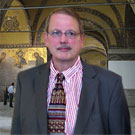
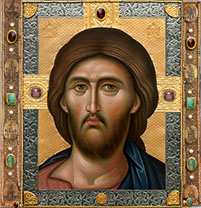 click here for icons of christ
click here for icons of christ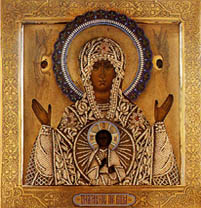 click here for icons of the theotokos
click here for icons of the theotokos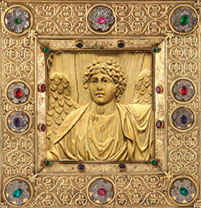 click here for icons of angels
click here for icons of angels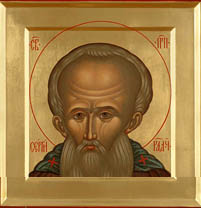 click here for icons of saints
click here for icons of saints








